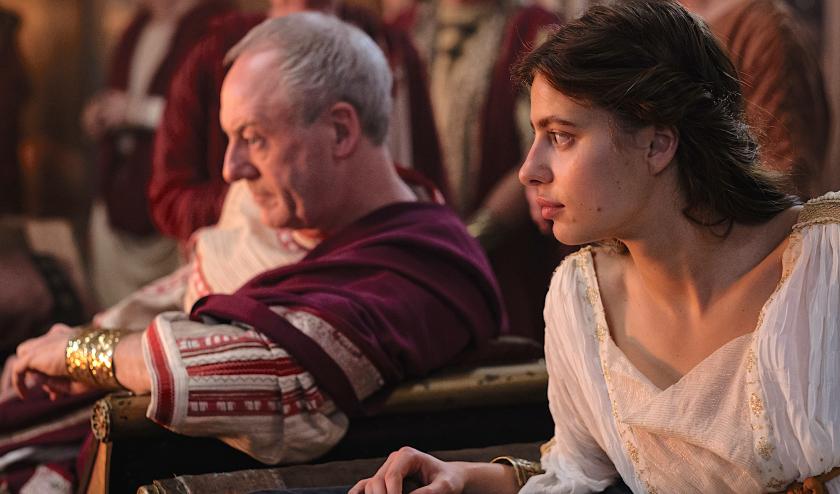Ancient Rome has always been a popular playground for film and TV, whether it’s Ben Hur, Gladiator or the 2005 TV series Rome. This Italian-made series for Sky Atlantic was shot at the renowned Cinecittà Studios in Rome, where Visconti, Leone, Scorsese and Bertolucci have all worked, but sadly none of that old-time movie magic has rubbed off on it.
We are transported back to 40BC or thereabouts, and it’s the aftermath of the assassination of Julius Caesar. Caesar’s son Gaius (Tom Glynn-Carey, pictured below) and Marcus Antonius (Liam Garrigan) are revolting, and also planning a power grab. This is not very subtle, and consists of them drawing up a list of nobles and knights connected with the killing of Caesar, murdering them and seizing their property. Cue panic and pandemonium among the Roman toffocracy.
The idea is that the story will be told through the eyes of Rome’s women, chief among these being Livia Drusilla. She’s the high-born daughter of Livius (Liam Cunningham, probably the best thing in the show), but his involvement with the plot against Caesar threatens to cause his downfall. Pre-publicity might have led you to believe that Livia is played by Polish actress Kasia Smutniak, but not yet – the story is set to gallop forwards through the decades, and in the first two episodes the teenage Livia was played by Nadia Parkes. This is very confusing, because all the characters are suddenly going to look completely different as the cast switches over (the trailer for episode three thus made no sense whatsoever.)
 Despite all the political manoeuvrings and skulduggery, Domina remains flat-footed and non-dynamic, most taking place in dimly-lit rooms and passageways. If you were expecting massed armies slugging it out across Mediterranean landscapes or scintillating sea battles, think again. Although much effort has gone into period clothing, sets and décor, the dialogue is little better than functional, and the cast speak it as if they’re in Skins or The Inbetweeners rather than a weighty historical epic. Everyone says “fuck” a lot.
Despite all the political manoeuvrings and skulduggery, Domina remains flat-footed and non-dynamic, most taking place in dimly-lit rooms and passageways. If you were expecting massed armies slugging it out across Mediterranean landscapes or scintillating sea battles, think again. Although much effort has gone into period clothing, sets and décor, the dialogue is little better than functional, and the cast speak it as if they’re in Skins or The Inbetweeners rather than a weighty historical epic. Everyone says “fuck” a lot.
Sprawling chunks of of time are spent with characters huddling together and delivering hefty chunks of exposition. This fills the viewer in on the geopolitics of the Roman empire and introduces numerous characters with interminable Latin names, but it slows the narrative to a glacial pace.
There are various asides about the lot of women in Rome, and how they must be chaste and virtuous, support their husbands, and do a bit of weaving in their spare time. However, ambitious Livia has no intention of being a subservient appendage, and wants to regain the possessions and privileges she considers to be her birthright.
Livius joined up with Caesar’s killers Brutus and Cassius, only to commit suicide after the battle of Philippi in Macedonia (he keeps materialising in front of Livia in flashbacks when she needs a bit of a pick-me-up, though). After a spell of exile in Sicily, Livia has returned to Rome to implement her plan to gain power and status. She’s proposing to dump her simpering ninny of a husband, Nero (Enzo Cilenti), and hook up with Gaius. We can only hope that a sudden deluge of chaos and mayhem will ensue.















Add comment